初中动词讲解与练习
系动词讲解与练习-初中英语

系动词讲解与练习-初中英语(学生)(总3页)--本页仅作为文档封面,使用时请直接删除即可----内页可以根据需求调整合适字体及大小--Linking Verb系动词(Link Verb),它本身有词义,但不能单独用作谓语,不能用进行时态,后边必须跟表语(adj)即:link v + adj,构成系表结构说明主语的状况、性质、特征等情况。
(1)be 动词We are good friends.The earth is as round as a ball.(2)感官系动词: feel, smell, sound,Your idea sounds great.The flowers smell sweet and nice.The pizza made by Lucy tastes delicious.Ice always feels cold to us.(3)变化系动词: become, grow, turn, fall, get, goThe days become longer and longer in summer.Her face turned red when the teacher called her name.The child fell asleep while he doing his homework.Everything will come all right in the end.(4) 表像系动词: seem, appear, look, “看起来、显得”seem/ appear+(to be ) adj/nShe seemed (to be) an honest woman.He seemed (to be) interested in the book .He looked(看起来) angry/ sad/ happy.He appeared (to be) disappointed.(5) 持续系动词:keep, hold, remain, stay, 表示状态、情况等的继续或保持。
初中必备英语动词的时态技巧全解及练习题(含答案)
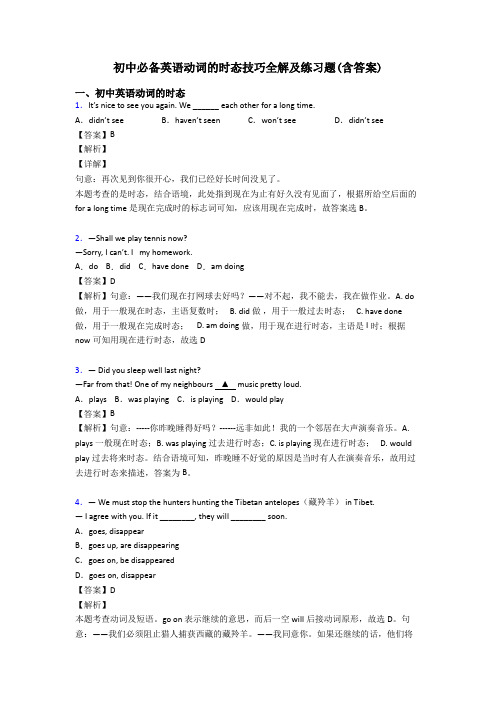
初中必备英语动词的时态技巧全解及练习题(含答案)一、初中英语动词的时态1.It’s nice to see you again. We ______ each other for a long time.A.didn’t see B.haven’t seen C.won’t see D.didn’t see【答案】B【解析】【详解】句意:再次见到你很开心,我们已经好长时间没见了。
本题考查的是时态,结合语境,此处指到现在为止有好久没有见面了,根据所给空后面的for a long time是现在完成时的标志词可知,应该用现在完成时,故答案选B。
2.—Shall we play tennis now?—Sorry, I can’t. I my homework.A.do B.did C.have done D.am doing【答案】D【解析】句意:——我们现在打网球去好吗?——对不起,我不能去,我在做作业。
A. do 做,用于一般现在时态,主语复数时; B. did做,用于一般过去时态; C. have done 做,用于一般现在完成时态; D. am doing做,用于现在进行时态,主语是I时;根据now可知用现在进行时态,故选D3.— Did you sleep well last night?—Far from that! One of my neighbours ▲ music pretty loud.A.plays B.was playing C.is playing D.would play【答案】B【解析】句意:-----你昨晚睡得好吗?------远非如此!我的一个邻居在大声演奏音乐。
A. plays一般现在时态;B. was playing 过去进行时态;C. is playing 现在进行时态; D. would play过去将来时态。
结合语境可知,昨晚睡不好觉的原因是当时有人在演奏音乐,故用过去进行时态来描述,答案为B。
(完整版)最新初中英语常见动词短语汇总及练习题(附解析)

初中英语高频考点之动词短语及习题(附解析)一.同一动词+不同介词/副词break 短语break in 打断;闯入break into 破门而入break out 爆发break up 打碎;结束;解散break down 发生故障;抛锚,分解break away 脱离,放弃come短语come up 升起;发生come up with 想出(主意)come across (偶然)遇见(或发现)come along 进展;一起去come down下降;下落come in 进来come from来自come back 回来come on 赶快;加油come out出版,发行;出现;开花;发芽come over 过来;顺便来访come true(希望、梦想等)实现,成为现实cut 短语cut up 切碎cut down 砍到,消减cut off 切断,切除cut out 删除;删去;剪下cut in 插嘴fall短语fall into 落入;陷入fall behind 落后fall down 摔倒,倒塌fall off (从……上)掉下fall asleep 入睡fall over 绊倒;跌倒get短语get away 逃离get back返回get down 下降get on上车get off下车get over 克服get up起床;起来get along/on with sb. 与某人相处go短语go away走开;离开go back回去go up上升;增长go out出去;熄灭go off(闹钟)发出响声go over仔细检查;复习go through通过give短语give away赠送;分发give back还给;归还;恢复(健康等)give in投降,屈服give out发出(气味、光线、声音、信号);分发give up放弃jump短语jump into 跳入jump over 跳过jump off 跳离leave短语leave for 出发前往;动身去leave behind 留下;遗留leave out 遗漏;省去;不考虑leave alone 不打扰;不理look短语look after 照顾;照看look at看look around 环顾四周look for寻找;寻求look into 调查look out当心look over (仔细)检查look through浏览look up(在词典、参考书等中)查阅;查找look up to钦佩;仰慕;尊敬look down upon瞧不起look forward to 盼望;期待put短语put away把……收起来;储存……备用put down写下;放下put off推迟;拖延put on穿上;上演;增加put out扑灭;熄灭(火);伸出put up 张贴;搭建put back 放回原处;把(钟)拨慢take短语take away拿走;带走take down取下;记下;拆卸take in吸入;吞入(体内)take out取出take off 脱下(衣服);(飞机等)起飞take up占据(时间、空间);开始从事;拿起take care当心;小心take after (在外貌、性格等方面)与(父母等)相像take care of照看;照顾turn短语turn down调低;拒绝turn up调高;出现turn on打开;接通turn off 关闭;切断turn out结果是turn in上交send out 发出,发送,派遣send up 发射send for 派人去请send in 寄去,递交二.不同动词+同一介词/副词about短语care about 关心;在意hear about (=hear of )听说talk about谈论;讨论;think about考虑;认为throw about 乱丢;抛撒worry about担心at短语point at 指向look at 看(某人)throw at 投向;掷向laugh at (sb.)嘲笑(某人)knock at 敲shout at(sb.)对(某人)大喊aim at 瞄准;旨在get away逃离give away 赠送;分发put away把……收起来;储存……备用run away逃跑;跑掉take away 拿走throw away扔掉move away 搬走,移开back短语bring back 恢复;使想起;归还come back回来get back回来;恢复give back归还;送回go back 回去talk back 回嘴;顶嘴pay back 偿还(借款等)down短语break down 停止运转;出故障calm down 保持冷静cut down砍倒;削减fall down 落下;摔倒get down 下来;落下put down 写下;记下;放下shut down 关上;停业shoot down 射下,击落take down 拆除;记录turn down调低;关小;拒绝write down写下;记下in短语believe in信任;信赖bring in 引进;生产check in 报到;登记come in进来hand in交上;提交;呈送take in吸入;吞入(体内);理解;欺骗join in 参加,加入of短语hear of 听说think of 想起;认为;考虑get out of 离开;从……出来take care of照顾;照看off短语break off突然中止;中断cut off切除;切断drop off 减少;下降fall off从……掉下get off脱下;下车go off (闹钟)发出响声;发出(光、热等)keep off勿踏;勿踩knock off 停止做某事pay off偿清(欠款等)put off推迟;拖延run off 跑掉;迅速离开see off(为某人)送行set off动身(去某地);起程send off 派遣shut off关闭;停止运转take off 脱下(衣服),(飞机等)起飞tell off 责备;分派turn off 关闭on短语put on 穿上turn on打开fight on坚持pass on 传递keep on继续(进行)try on试穿;试试看work on从事;忙于depend on依赖come on赶快;加油;来吧hold on等一等(别挂电话)out短语blow out 吹灭break out(战争、火灾等)突然发生;爆发bring out 使显现;使表现出check out查看;观察clean out清除;把……打扫干净clear out 清理;丢掉come out出版;发表cut out 删除;删去find out查明;弄清get out 出去,离开give out发出(气味、光线、声音、信号);分发go out 出去;熄灭hand out分发;发放hang out 闲逛keep out不让......进入leave out 不包括;不提及;忽略look out留神;当心put out扑灭;熄灭(火)point out 指出run out 用尽;耗尽sell out卖完;售光set out 出发;启程stand out 站出来;突出;坚持到底take out取出work out算出;解决help (sb.) out帮助(某人)解决困难over短语come over 过来;顺便来访fall over 绊倒;跌倒get over 克服;恢复;原谅go over 仔细检查;复习look over(仔细)检查think over 仔细考虑up短语bring up教育;培养;提出cheer up使振奋;使高兴起来(cheer sb. up) clean up(把……)打扫干净;(把……)收拾整齐cut up切碎dress up穿上盛装;装扮eat up 吃光;吃完fix up修理;修补get up 起床give up放弃grow up成长;长大hang up挂断电话hurry up赶快look up(在词典、参考书等中)查阅;查找make up 编造;形成;组成pick up捡起;接电话put up张贴;搭建ring up 打电话send up 发射,把……送上去set up建立;创立;开办show up出席;露面stay up不睡觉;熬夜take up (尤指为消遣)学着做;开始做think up想出turn up开大(声音);出现use up用完;用光;耗尽wake up 醒来with短语agree with赞同;持相同意见begin with以……开始connect with与……相连deal with处理;应付catch up with 赶上come up with提出;想出(主意、回答等) get along/on with sb.与某人相处go on with继续keep in touch with sb.与某人保持联系keep up with与......并驾齐驱;跟上习题及解析1.We will never _______ our dream until it comes true one day.A.give upB. give inC. give outD. give awayA【解析】句意:我们永远不会_____ 我们的梦想直到它实现的那一天。
初中英语动词练习题及解析
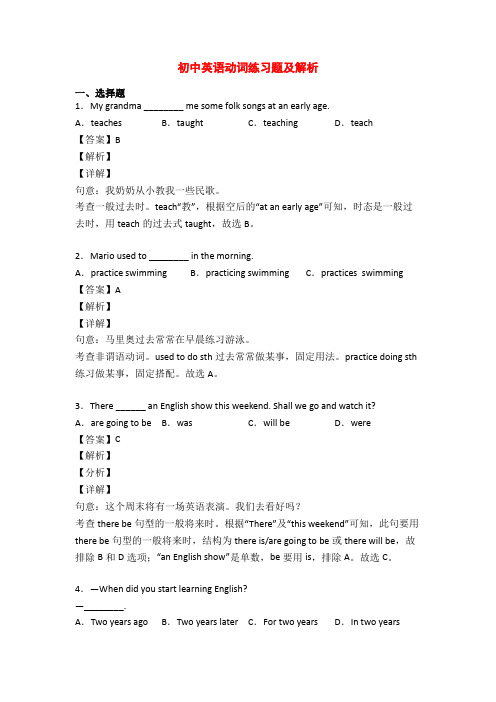
初中英语动词练习题及解析一、选择题1.My grandma ________ me some folk songs at an early age.A.teaches B.taught C.teaching D.teach【答案】B【解析】【详解】句意:我奶奶从小教我一些民歌。
考查一般过去时。
teach“教”,根据空后的“at an early age”可知,时态是一般过去时,用teach的过去式taught,故选B。
2.Mario used to ________ in the morning.A.practice swimming B.practicing swimming C.practices swimming 【答案】A【解析】【详解】句意:马里奥过去常常在早晨练习游泳。
考查非谓语动词。
used to do sth过去常常做某事,固定用法。
practice doing sth 练习做某事,固定搭配。
故选A。
3.There ______ an English show this weekend. Shall we go and watch it?A.are going to be B.was C.will be D.were【答案】C【解析】【分析】【详解】句意:这个周末将有一场英语表演。
我们去看好吗?考查there be句型的一般将来时。
根据“There”及“this weekend”可知,此句要用there be句型的一般将来时,结构为there is/are going to be或there will be,故排除B和D选项;“an English show”是单数,be要用is,排除A。
故选C。
4.—When did you start learning English?—________.A.Two years ago B.Two years later C.For two years D.In two years【解析】【详解】句意:——你什么时候开始学英语的?——两年前。
动词不定式讲解,专项练习及答案
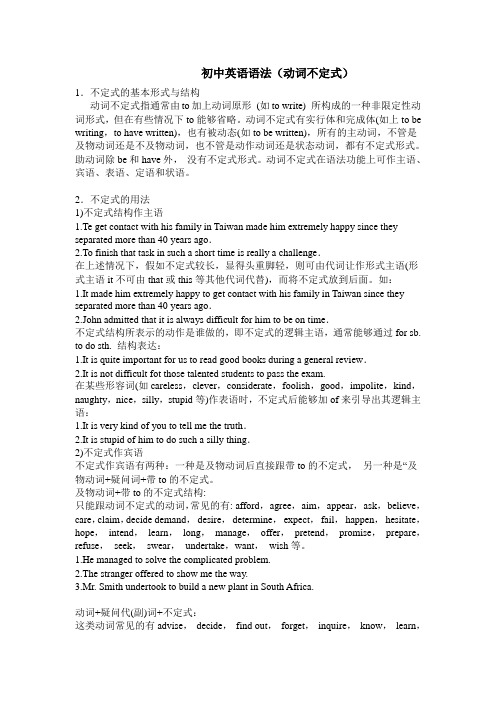
初中英语语法(动词不定式)1.不定式的基本形式与结构动词不定式指通常由to加上动词原形(如to write) 所构成的一种非限定性动词形式,但在有些情况下to能够省略。
动词不定式有实行体和完成体(如上to be writing,to have written),也有被动态(如to be written),所有的主动词,不管是及物动词还是不及物动词,也不管是动作动词还是状态动词,都有不定式形式。
助动词除be和have外,没有不定式形式。
动词不定式在语法功能上可作主语、宾语、表语、定语和状语。
2.不定式的用法1)不定式结构作主语1.Te get contact with his family in Taiwan made him extremely happy since they separated more than 40 years ago.2.To finish that task in such a short time is really a challenge.在上述情况下,假如不定式较长,显得头重脚轻,则可由代词让作形式主语(形式主语it不可由that或this等其他代词代替),而将不定式放到后面。
如:1.It made him extremely happy to get contact with his family in Taiwan since they separated more than 40 years ago.2.John admitted that it is always difficult for him to be on time.不定式结构所表示的动作是谁做的,即不定式的逻辑主语,通常能够通过for sb. to do sth. 结构表达:1.It is quite important for us to read good books during a general review.2.It is not difficult fot those talented students to pass the exam.在某些形容词(如careless,clever,considerate,foolish,good,impolite,kind,naughty,nice,silly,stupid等)作表语时,不定式后能够加of来引导出其逻辑主语:1.It is very kind of you to tell me the truth.2.It is stupid of him to do such a silly thing.2)不定式作宾语不定式作宾语有两种:一种是及物动词后直接跟带to的不定式,另一种是“及物动词+疑问词+带to的不定式。
初中英语动词知识点总结、例句及练习题

初中英语动词知识点总结、例句及练习题动词类型动词是英语中最基本的词类之一,表示动作、状态、行为等。
根据动词的不同特点,可以将其分为以下几种类型:1. 及物动词:需要接宾语来完成意义的动词。
例:throw (扔),“He throws a ball.” (他扔一个球。
)throw (扔),“He throws a ball.” (他扔一个球。
)2. 不及物动词:不需要接宾语的动词。
例:run (跑),“The dog is running.” (那只狗在跑。
)run (跑),“The dog is running.” (那只狗在跑。
)3. 连系动词:用来表示主语的状态、特征或性质的动词。
例:be (是),“She is smart.” (她很聪明。
)be (是),“She is smart.” (她很聪明。
)动词时态动词的时态表示动作或状态发生的时间。
以下是常见的动词时态:1. 一般现在时:表示经常性的动作或现实存在的状态。
例:play (玩),“I play soccer every Sunday.” (我每个星期天踢足球。
)play (玩),“I play soccer every Sunday.” (我每个星期天踢足球。
)2. 一般过去时:表示过去某个时间发生的动作或状态。
例:watch (看),“She watched a movie last night.” (她昨晚看了一场电影。
)watch (看),“She watched a movie last night.” (她昨晚看了一场电影。
)3. 现在进行时:表示正在进行的动作。
例:study (研究),“They are studying for exams.” (他们正在为考试复。
)study (学习),“They are studying for exams.” (他们正在为考试复习。
)动词的形式动词可以根据不同的时态和语态变化形式。
初中英语动词练习题及解析100题
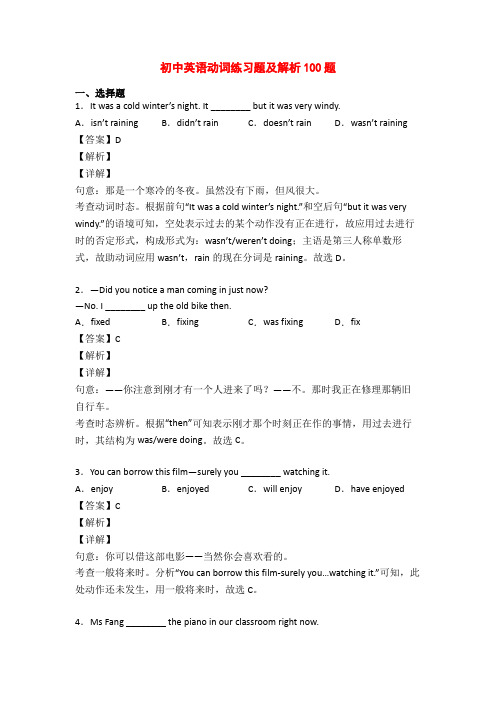
初中英语动词练习题及解析100题一、选择题1.It was a cold winter’s night. It ________ but it was very windy.A.isn’t raining B.didn’t rain C.doesn’t rain D.wasn’t raining 【答案】D【解析】【详解】句意:那是一个寒冷的冬夜。
虽然没有下雨,但风很大。
考查动词时态。
根据前句“It was a cold winter’s night.”和空后句“but it was ver y windy.”的语境可知,空处表示过去的某个动作没有正在进行,故应用过去进行时的否定形式,构成形式为:wasn’t/weren’t doing;主语是第三人称单数形式,故助动词应用wasn’t,rain的现在分词是raining。
故选D。
2.—Did you notice a man coming in just now?—No. I ________ up the old bike then.A.fixed B.fixing C.was fixing D.fix【答案】C【解析】【详解】句意:——你注意到刚才有一个人进来了吗?——不。
那时我正在修理那辆旧自行车。
考查时态辨析。
根据“then”可知表示刚才那个时刻正在作的事情,用过去进行时,其结构为was/were doing。
故选C。
3.You can borrow this film—surely you ________ watching it.A.enjoy B.enjoyed C.will enjoy D.have enjoyed 【答案】C【解析】【详解】句意:你可以借这部电影——当然你会喜欢看的。
考查一般将来时。
分析“You can borrow this film-surely you…watching it.”可知,此处动作还未发生,用一般将来时,故选C。
初中英语动词练习题及解析
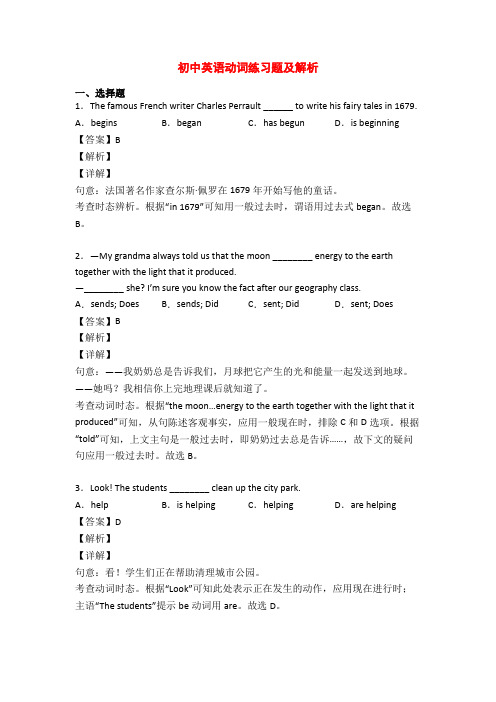
初中英语动词练习题及解析一、选择题1.The famous French writer Charles Perrault ______ to write his fairy tales in 1679. A.begins B.began C.has begun D.is beginning 【答案】B【解析】【详解】句意:法国著名作家查尔斯·佩罗在1679年开始写他的童话。
考查时态辨析。
根据“in 1679”可知用一般过去时,谓语用过去式began。
故选B。
2.—My grandma always told us that the moon ________ energy to the earth together with the light that it produced.—________ she? I’m sure you know the fact after our geography class. A.sends; Does B.sends; Did C.sent; Did D.sent; Does【答案】B【解析】【详解】句意:——我奶奶总是告诉我们,月球把它产生的光和能量一起发送到地球。
——她吗?我相信你上完地理课后就知道了。
考查动词时态。
根据“the moon…energy to the earth together with the light that it produced”可知,从句陈述客观事实,应用一般现在时,排除C和D选项。
根据“told”可知,上文主句是一般过去时,即奶奶过去总是告诉……,故下文的疑问句应用一般过去时。
故选B。
3.Look! The students ________ clean up the city park.A.help B.is helping C.helping D.are helping【答案】D【解析】【详解】句意:看!学生们正在帮助清理城市公园。
- 1、下载文档前请自行甄别文档内容的完整性,平台不提供额外的编辑、内容补充、找答案等附加服务。
- 2、"仅部分预览"的文档,不可在线预览部分如存在完整性等问题,可反馈申请退款(可完整预览的文档不适用该条件!)。
- 3、如文档侵犯您的权益,请联系客服反馈,我们会尽快为您处理(人工客服工作时间:9:00-18:30)。
动词动词的分类基本上是分为四类:系动词,助动词,情态动词和行为动词。
一:系动词1.be动词:be动词是最常见的连系动词,它的一般现在时态形式有am,is,are;过去时的形式是was,were。
随主语的人称和数的变化而变化。
如:I am a teacher. They are happyEg. -----There _______a lot of meat on the plate. Would you like some ? ------Just a little, pleaseA. isB. areC. amD. beThis pair of jeans______Tina’sA. areB. beC. isD. will be2.其他可以做系动词的词:另外有一些词也可以做系动词用,其后接形容词,名词或介词短语,这类词有become,turn,grow,look,smell,sound, taste 等。
如:Tom’s mother looks tiredThe cake tastes deliciousEg. The English song______very nice. Can you guess who is singing? A. smells B. looks C. tastes D. soundsThe food in that restaurant_______delicious, but it tastes badA. looksB. feelsC. becomesD. gets3. 可做实义动词的系动词:大多数感官动词,都既可以做系动词,也可以做实义动词,此时单独做谓语。
如:He felt ill yesterdayEg. I like wearing clothes made of cotton because cotton_______nice and softA. is feelB. is feelingC. feelD. feelsPlease_______ the soup to see whether I have put enough salt in itA. smellB. feelC. eatD. taste二:助动词:助动词本身没有意义,不能单独做谓语,只能和行为动词一起构成谓语,表示疑问,否定,时态及语态等。
如:I don’t like it He doesn’t watch TV in the meetingEg. ------Lucy, what about going camping if ______tomorrow?------Sounds great!A. didn’t rainB. doesn’t rainC. won’t rainD. hasn’t rain------What _______your mother look like?------She has long hairA. doesB. doC. is三:情态动词:表示说话人的语气和情态,如需要,可能,怀疑,愿意等,有一定的词义,但不完整,必须和主要动词的原形一起构成谓语,常见的情态动词有:can, could, may, might, must, need, shall, will, should, would及半情态动词had better, have to1. can , could::can和 could 意为“能,会”表示请求,could的语气比can 更委婉。
如:------Could I borrow your bike?------Yes, you canEg. -------Is John coming by train?------He should, but he ______not. He likes driving his carA. mustB. canC. mayD. needPeople _______breathe when they are under waterA. can’tB. mustn’tC. shouldn’tD. needn’t2.may 的用法:may 可以表示许可或推测,表推测时意为“或许,可能”,但只用在陈述句中。
如: You may go home.May I smoke here? Take a raincoat with you, It may rainEg . ------Is Mr Brown driving here?-------I’m not sure. He ______come by trainA. mayB. shallC.needD. must------______I swim in that river?------No, you_______. It is dangerous to swim in itA. Must, Can’tB. Can, may notC. May, mustn’t3. must 与 have to的用法:(1)must意为“必须”,表示说话人的主观看法,have to表示客观需要。
如:You must be here before fiveo’clock It’s too la te, I have to leave now(2)must 表“必须”时,其否定式是needn’t如:------Must I finish my homework now?------No, you needn’t(3)must可表示“猜测”,一般用于肯定句,它的肯定程度比may,might大的多,意为“一定是,准是”,如果要表示否定时,不可用mustn’t;而是 can not。
因为mustn’t表示“不准,禁止”。
如:Her answer can’t be right. The r oom is locked. She can’t be in Eg . -----Mike, I can’t stop playing computer games------For your eyes, my dear friend, I’m afraid you______A. have toB. mayC. canD. must------Must I stay at home and take care of her?------No, you ________A. mustn’tB. won’tC. can’tD. needn’t4. need 的用法:need既可以做情态动词,也可以做实义动词,need做情态动词主要用在疑问句,否定句中,否定式是needn’t;做实义动词有人称,数,时态的变化,肯定式是need todo sth,否定式是needn’t to do sth。
如:Need you go now? We needn’t do our homework nowDo you need to know it ? He need to go homeEg. -------May I do the rest of the work tomorrow?-------Yes, of course. You_____finish it todayA. mustB. mustn’tC. needn’tYou_______do it if you really don’t want toA. needn’tB. mustn’tC. can’tD. couldn’t5. had better的用法:(1)had better意为“最好“,没有人称的变化,后接不带to的不定式。
如:We had better catch a early bus You had better go there by bus(2) 否定式为had better not,如:You’d better not make any noiseEg . You’d better_______smoking, ______you will get illA. go on, soB. give up, andC. give up, orYou look tired, You’d better________a good sleepA. haveB. havingC. hadD. to have四、行为动词:行为动词 vt./vi. 表示动作或状态。
有完整的词义。
能独立作谓语。
按其带不带宾语、分为及物动词(带宾语)和不及物动词(不带宾语)help帮助(vt.) see看见(vt.) go去(vi.) fly飞(vi.) He often helps me. I can see a bird in the tree. Planes can fly.1)行为动词又可分为及物动词(vt.)和不及物动词(vi.)两种。
及物动词作谓语,后面必须跟宾语意思才完整。
不及物动词作谓语,后面不能跟宾语,只有加上介词后才可接宾语。
2)英语中有些动词常常是既作及物动词又作不及物动词;既作连系动词工作及物动词。
例如:He speaks English very well. (vt.) 他英语讲得好。
He spoke at the meeting. (vi.)另外,动词按其在句中能否作谓语,又可分为谓语动词(finite verb)和非谓语动词(non-finite verb)两大类。
说明:谓语动词又称限定动词,非谓语动词又称非限定动词。
非谓语动词初中阶段主要学习动词不定式的用法。
练习:1.I will tell him as soon as he _____ backA. comeB. comesC. will comeD. came2. Mary _____ on shoes when she ____ them.A. tries…buysB. tries… buiesC. trys… buysD. trys… buies3. The girl often ______ cold when she ______.A. cathcs…dancesB. catches… dancesC. catchs…danceesD. catches… dancee4. _____ he ____ himself there? No, I don't think so.A. Do…enjoyB. Does… enjoiesC. Does… enjoysD. Does…enjoy5. _____ your teacher ____ from them very often? Certainly.A. Do…hearB. Does…hearC. Do… receiveD. receive6. _____ your mother _____ some cleaning on Sundays?A. Does…doesB. Do…doesC. Does…doD. Do… do7. _____ Tom _____to work hard to help his family ? Yes, he _____.A. Has… x…doesB. Has…x…doesC. Does…has…hasD. Does… have…does8. Which teacher _____ lessons to you every day ?A. does …givesB. does… giveC. do… giveD. gives9. Smith does not go fishing on weekdays, ____? _____ , he does.A. does he…NoB. does he…YesC. doesn't he…NoD. doesn't he…Yes10.Mr Black often _____ fishing on Sundays, _____ he ?A. goes…doesn'tB. goes…isn'tC. doesn't go…doesD. doesn't go…is11.He usually _____ TV on Sunday evening.A. watchB. watchesC. watchingD. is watching12. We'll go to play with snow if it ______ tomorrow.A. snowB. snowsC. will snowD. snowed13. Neither I nor he ______ French.A. speakB. doesn't speakC. speaksD. doesn't speak14. Nobody ______ how to run this machines.A . know B. have known C. knows D. is knowing15. The Young Pioneer _____ water for the old man every day.A. carryB. bringC. takesD. carries16. Some are ______ in the river and some are ______ games.A. swimming… playingB. swimming…plaiingC. swimming… I playingD. swimming…plaing17. Look ! The boy students are _____ football while the girls are _____ .A. playing… danceB. playing… dancingC. play… dancingD. play… dance18. He _____ to do his lessons at eight every evening.A. is beginningB. is beginningC. beginD. begins19. _____ he _____ on well with his friends this term ?A. Does…getsB. Does…getC. Is…gettingD. Is…geting20. Mr Smith _____ short stories, but he ____ a TV play these days.A. is writing…is writingB. is writing… writesC. writes… is writingD. writes… writes21. I _____ to the cinema. I ______ there every Sunday.A. go…goB. am going… goC. go… am goingD. am going…am going22. Look, they______ a good time, ____ they ?A. have…doB. have…don'tC. are having…areD. are having… aren't23. You ______ about the future now, ______ you ?A. don't think…don'tB. aren't thinking… aren'tC. don't think… doD. aren't thinking… are24. She always ______ something whenever she ______.A .studied…played B. studied…plaiedC.. studied…plaiedD. studied… played25. He often _____ late in the forest. It _____ me very much.,A. stayed…worriedB. staied… worriedC. stayed…worryedD. staied… worried来源26. I ______that the boy _____ with no tears in his eyes.A. noticed… cryedB. noticed… criedC. noticed…criedD. noticed… cryed27. We _____the floor and _____ all the windows.A. mopped… cleannedB. moped… cleanedC. mopped…cleanedD. moped… cleaned28. When I _____ the Children's Palace, the children _____ with joy.A. visited… jumppedB. visited… jumpedC. visited… jumpedD. visited… jumpped29. ______ a sports meet last Sunday ? Yes , they ______.A. Did they have… didB. Did they have… hadC. Had they... had D. Had they (i)30. ____ you _____out for a walk after supper ? Yes, I ______.A. Did…went…wentB. Did… go… wentC. Did... went... did D. Did... go (i)31. _____ Jack _____ on with his work or ______ to have a rest?A. Did… went… stoppedB. Did… go… stopC. Did… went… stopD. Did… go… stopped32. You gave them a talk two days ago, _____you ? Yes, I ______.A. did… didB. did… gaveC. didn't… didD. didn't… gave33. ____ your brother _____ a letter to ? My father.A. Who… wroteB. What…wroteC. Who did…writeD. What did… write34. They _____ about the TV news then in the sitting-room. They often ____ such talksA. talked…hadB. talk…haveC. were talking…hadD. are talking…have35. He ______ some cooking at that time, so _____ me.A. did… heardB. did… didn't hearC. was doing… heardD. was doing… didn't hear36. " _____ you angry then?" "They_ too much noise.”A. Are…were makingB. Were…were makingC. Are…madeD. Were… made37. This time yesterday Jack _____ his, bike. He _____ TV.A. repaired… didn't watchB. was repairing… watchedC. repaired… watchedD. was repairing… wasn't watching38. We _____ for Tom at ten last Sunday. He often kept us ______.A. were waiting… waitingB. were waiting… waitC. waited… waitingD. waited… wait39. When you _____ at the door, I _____ some washing.A. knocked... did B. was knocking (i)C. knocked… was doingD. knock… am doing40. The boy_____ English on the radio when I _____ his door.A. learned… was openingB. was learning… openedC. learned… openedD. is learning… open41. When they______ through the forest, a bear _____ at them.A. walked… was comingB. were walking… cameC. were talking… comesD. walk… is coming42. A young man _____ her while she _____ her work .A. watched… was finishingB. was watching… finishedC. watched… finishedD. was watching… was finishing43. While mother _____ some washing, I ______ a kite for Kack.A. did… madeB. was doing… madeC. was doing… was makingD. did… was making44. I _____ myself French from 7 to 9 yesterday morning. I _____ to work.A. was teaching… didn't goB. taught… didn't goC. was teaching… wentD. taught… went45. He _____ a model plane when I came to see him.A. makesB. is makingC. was makingD. made46. I ______ a letter at nine last night.A. is writingB. was writingC. wroteD. is writing47. The teacher_____ (give) us a history lesson when Tom walked into the classroom.A. gaveB. is givingC. was givenD. was giving48. There will be a football match in two days, that is _______.A. last SundayB. next SundayC. every SundayD. this Sunday49. We ______ class meeting this November.A. hadB. haveC. will haveD. are having50. He ______ in his garden every morning next year.A. will workB. worksC. workedD. is working答案:1—5 BABDB 6—10 CDDBA 11—15 BBCCD 16—20 CBDCC21-25 BDDDA 26—30 BCBAD 31—35 BCCCD 36—40 BDACB41-45 BDCAC 46—50 BDDCA。
